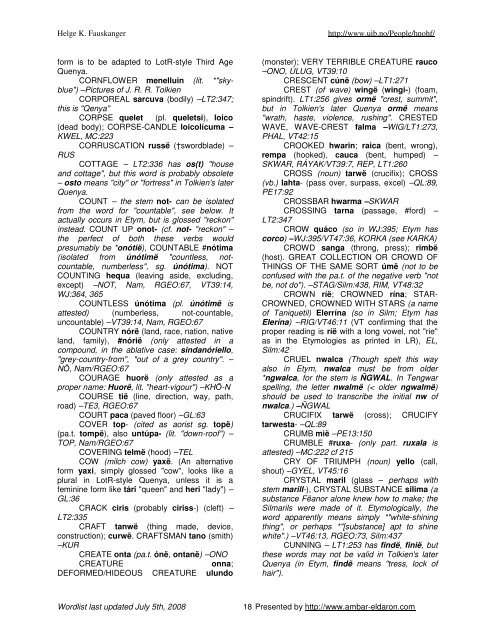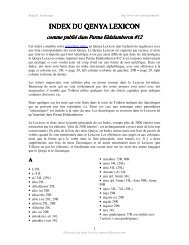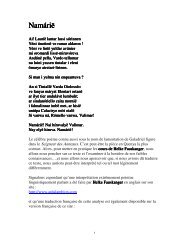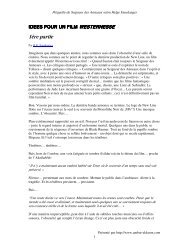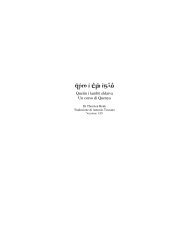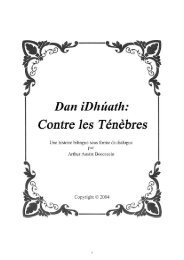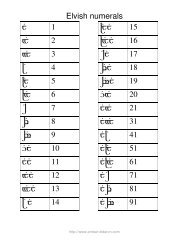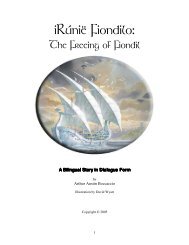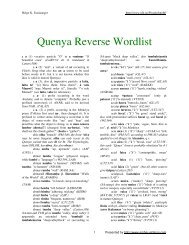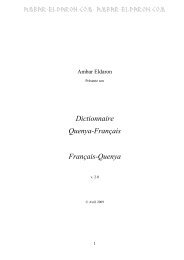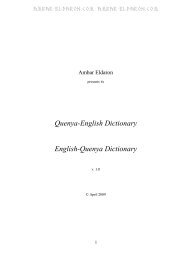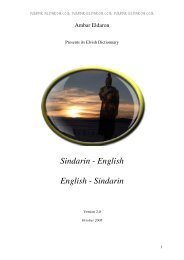English – Quenya - Ambar Eldaron
English – Quenya - Ambar Eldaron
English – Quenya - Ambar Eldaron
Create successful ePaper yourself
Turn your PDF publications into a flip-book with our unique Google optimized e-Paper software.
Helge K. Fauskanger http://www.uib.no/People/hnohf/<br />
form is to be adapted to LotR-style Third Age<br />
<strong>Quenya</strong>.%<br />
CORNFLOWER menelluin (lit. *"skyblue")<br />
<strong>–</strong>Pictures of J. R. R. Tolkien<br />
CORPOREAL sarcuva (bodily) <strong>–</strong>LT2:347;<br />
this is "Qenya"<br />
CORPSE quelet (pl. queletsi), loico<br />
(dead body); CORPSE-CANDLE loicolícuma <strong>–</strong><br />
KWEL, MC:223<br />
CORRUSCATION russë (†swordblade) <strong>–</strong><br />
RUS<br />
COTTAGE <strong>–</strong> LT2:336 has os(t) "house<br />
and cottage", but this word is probably obsolete<br />
<strong>–</strong> osto means "city" or "fortress" in Tolkien's later<br />
<strong>Quenya</strong>.<br />
COUNT <strong>–</strong> the stem not- can be isolated<br />
from the word for "countable", see below. It<br />
actually occurs in Etym, but is glossed "reckon"<br />
instead. COUNT UP onot- (cf. not- "reckon" <strong>–</strong><br />
the perfect of both these verbs would<br />
presumably be *onótië), COUNTABLE #nótima<br />
(isolated from únótimë "countless, notcountable,<br />
numberless", sg. únótima). NOT<br />
COUNTING hequa (leaving aside, excluding,<br />
except) <strong>–</strong>NOT, Nam, RGEO:67, VT39:14,<br />
WJ:364, 365<br />
COUNTLESS únótima (pl. únótimë is<br />
attested) (numberless, not-countable,<br />
uncountable) <strong>–</strong>VT39:14, Nam, RGEO:67<br />
COUNTRY nórë (land, race, nation, native<br />
land, family), #nórië (only attested in a<br />
compound, in the ablative case: sindanóriello,<br />
"grey-country-from", "out of a grey country". <strong>–</strong><br />
NŌ, Nam/RGEO:67<br />
COURAGE huorë (only attested as a<br />
proper name: Huorë, lit. "heart-vigour") <strong>–</strong>KHŌ-N<br />
COURSE tië (line, direction, way, path,<br />
road) <strong>–</strong>TE3, RGEO:67<br />
COURT paca (paved floor) <strong>–</strong>GL:63<br />
COVER top- (cited as aorist sg. topë)<br />
(pa.t. tompë), also untúpa- (lit. "down-roof") <strong>–</strong><br />
TOP, Nam/RGEO:67<br />
COVERING telmë (hood) <strong>–</strong>TEL<br />
COW (milch cow) yaxë. (An alternative<br />
form yaxi, simply glossed "cow", looks like a<br />
plural in LotR-style <strong>Quenya</strong>, unless it is a<br />
feminine form like tári "queen" and heri "lady") <strong>–</strong><br />
GL:36<br />
CRACK ciris (probably ciriss-) (cleft) <strong>–</strong><br />
LT2:335<br />
CRAFT tanwë (thing made, device,<br />
construction); curwë. CRAFTSMAN tano (smith)<br />
<strong>–</strong>KUR<br />
CREATE onta (pa.t. ónë, ontanë) <strong>–</strong>ONO<br />
CREATURE onna;<br />
DEFORMED/HIDEOUS CREATURE ulundo<br />
(monster); VERY TERRIBLE CREATURE rauco<br />
<strong>–</strong>ONO, ÚLUG, VT39:10<br />
CRESCENT cúnë (bow) <strong>–</strong>LT1:271<br />
CREST (of wave) wingë (wingi-) (foam,<br />
spindrift). LT1:256 gives ormë "crest, summit",<br />
but in Tolkien's later <strong>Quenya</strong> ormë means<br />
"wrath, haste, violence, rushing". CRESTED<br />
WAVE, WAVE-CREST falma <strong>–</strong>WIG/LT1:273,<br />
PHAL, VT42:15<br />
CROOKED hwarin; raica (bent, wrong),<br />
rempa (hooked), cauca (bent, humped) <strong>–</strong><br />
SKWAR, RÁYAK/VT39:7, REP, LT1:260<br />
CROSS (noun) tarwë (crucifix); CROSS<br />
(vb.) lahta- (pass over, surpass, excel) <strong>–</strong>QL:89,<br />
PE17:92<br />
CROSSBAR hwarma <strong>–</strong>SKWAR<br />
CROSSING tarna (passage, #ford) <strong>–</strong><br />
LT2:347<br />
CROW quáco (so in WJ:395; Etym has<br />
corco) <strong>–</strong>WJ:395/VT47:36, KORKA (see KARKA)<br />
CROWD sanga (throng, press); rimbë<br />
(host). GREAT COLLECTION OR CROWD OF<br />
THINGS OF THE SAME SORT úmë (not to be<br />
confused with the pa.t. of the negative verb "not<br />
be, not do"). <strong>–</strong>STAG/Silm:438, RIM, VT48:32<br />
CROWN ríë; CROWNED rína; STAR-<br />
CROWNED, CROWNED WITH STARS (a name<br />
of Taniquetil) Elerrína (so in Silm; Etym has<br />
Elerína) <strong>–</strong>RIG/VT46:11 (VT confirming that the<br />
proper reading is ríë with a long vowel, not "rie"<br />
as in the Etymologies as printed in LR), EL,<br />
Silm:42<br />
CRUEL nwalca (Though spelt this way<br />
also in Etym, nwalca must be from older<br />
*ngwalca, for the stem is ÑGWAL. In Tengwar<br />
spelling, the letter nwalmë (< older ngwalmë)<br />
should be used to transcribe the initial nw of<br />
nwalca.) <strong>–</strong>ÑGWAL<br />
CRUCIFIX tarwë (cross); CRUCIFY<br />
tarwesta- <strong>–</strong>QL:89<br />
CRUMB mië <strong>–</strong>PE13:150<br />
CRUMBLE #ruxa- (only part. ruxala is<br />
attested) <strong>–</strong>MC:222 cf 215<br />
CRY OF TRIUMPH (noun) yello (call,<br />
shout) <strong>–</strong>GYEL, VT45:16<br />
CRYSTAL maril (glass <strong>–</strong> perhaps with<br />
stem marill-), CRYSTAL SUBSTANCE silima (a<br />
substance Fëanor alone knew how to make; the<br />
Silmarils were made of it. Etymologically, the<br />
word apparently means simply *"white-shining<br />
thing", or perhaps *"[substance] apt to shine<br />
white".) <strong>–</strong>VT46:13, RGEO:73, Silm:437<br />
CUNNING <strong>–</strong> LT1:253 has findë, finië, but<br />
these words may not be valid in Tolkien's later<br />
<strong>Quenya</strong> (in Etym, findë means "tress, lock of<br />
hair").<br />
Wordlist last updated July 5th, 2008 18 Presented by http://www.ambar-eldaron.com


